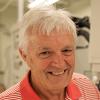Faculty

Prasanna Balachandran
My interests are in materials informatics, density functional theory, machine learning, bayesian inference, and optimal design methods applied to accelerate the search and discovery of novel 2D materials, metallic alloys, ferroic and electronic materials.

James T. Burns
James T Burns is the School of Engineering and Applied Science Copenhaver Fellow and Associate Professor of Materials Science and Engineering at the University of Virginia. He received his B.S. from the US Air Force Academy in 2002, M.S. from UVA in 2006, and Ph.D. from UVA in 2010.

Harsha K. Chelliah
Professor Chelliah is currently serving as the Program Director for Combustion and Fire Systems in the Division of Chemical, Bioengineering, Environmental and Transport Systems at the National Science Foundation (NSF). His research interests are vast and include fundamental investigations on interaction of finite-rate kinetics with transport.

Joshua J. Choi
Joshua Choi joined UVa in 2014 and is a recipient of a NASA Early Career Faculty Award (2015). His research group is developing novel and advanced synthetic methods to achieve robust heterostructure formation, surface structure and impurity doping. They seek to understand and control the structure-property relationships in these materials.

Chloe Dedic
Dedic received her B.S. and Ph.D. degrees from Iowa State University in 2012 and 2017, respectively. After graduation she worked as a visiting scientist with the National Institute of Aerospace at NASA Langley Research Center and joined the University of Virginia as an assistant professor in 2018. Dedic is an active member of the AIAA.

Prior to joining UVA as an Associate Professor in 2012, Dr. Dong was an associate professor of Mechanical Engineering at the Wright State University. He obtained his Ph.D. degree in Aerospace Engineering from UCLA in 2003. After completing his doctorate, he spent three years as a post-doctoral researcher at the George Washington University.

Patrick E. Hopkins
Patrick E. Hopkins is a Whitney Stone Professor in Engineering at the University of Virginia, with a primary appointment in the Department of Mechanical and Aerospace Engineering, and courtesy appointments in the Department of Materials Science and Engineering and the Department of Physics. He is also the director of the ExSiTE Lab.

Robert G. Kelly
Robert G. Kelly has been conducting research on the corrosion of metals for the past 30 years.

Gary Koenig
We are interested in the tailored synthesis of new materials at multiple length scales. At the molecular scale, the physical properties of materials are largely dependent on the stoichiometry and stable structures that can be formed.

Xiaodong (Chris) Li

Eric Loth
Prof. Eric Loth serves as the Rolls-Royce Commonwealth Professor of Engineering. Loth’s current research focuses on extreme-scale wind turbines, energy-storage systems, multiphase flow, and aerospace propulsion.

Lin Ma
4D Diagnostics & Thermal-Fluids
Development of novel diagnostics with 4D spatiotemporal resolution to study combustion, propulsion and fluid dynamics

Ji Ma
Ji Ma's research explores using additive manufacturing to create materials with novel properties and incorporating these materials in designed geometry to produce functionally unique parts, focusing on the additive manufacturing of metallic alloys and control of solidification, porosity, residual stress, and micro-to-nano-scale microstructure.

Elizabeth J. Opila
Our research focuses on materials for use in extreme environments and can be applied to materials for use in aircraft engines, rocket engines, energy conversion technologies, and thermal protection systems.

Tao Sun
Supervised by Prof. Vinayak Dravid and Dr. Jin Wang, my doctoral research at Northwestern University and Argonne National Laboratory was focused on fabrication and characterization of nanostructured oxides.

Haydn N. Wadley
Haydn N.G. Wadley is a professor of Materials Science and Engineering at UVA. He has interests in materials science, composite materials, micromechanics, and thermal transport. His current research explores high temperature thermal coatings systems, microarchitectured materials, entropy stabilized refractory metal alloys and rare earth silicates.
My interests are in computational thermodynamics and kinetics of materials, including first-principles alloy theory, CALPHAD, theories of phase transformations, and nonequilibrium thermodynamics. These methods are applied to lightweight alloys, high-temperature materials, and corrosion.